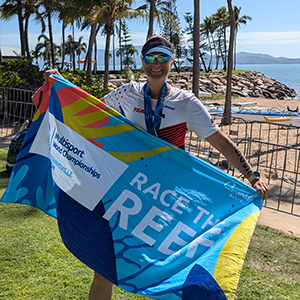La Salle University
Triathlon encourages passion, camaraderie, and empowerment for two faculty members from the School of Nursing and Health Sciences.

Years ago, Laurie Colborn, Ed.D., MSN, RN, was competing in a 70.3-mile triathlon when she saw a fellow racer fall off their bike. Without skipping a beat, she ran over to help.
“That’s the nurse in me, but that’s also the human in me,” Colborn, an assistant professor the School of Nursing and Health Sciences, said. “For me, human life is way more important than a race. There’s always another triathlon.”
That’s the spirit Colborn and many fellow triathletes take to race day: Encourage others to find their best, regardless of making it on the podium.
As La Salle gears up for its first all-women’s triathlon program, Colborn said she’s excited for students to be recruited for the team.
“My hope is for these young women to find the passion, camaraderie, and empowerment that I found through this sport,” she said.
Colborn has been competing in triathlons for 13 years: She participated in 10 this year alone, covering hundreds of miles of water and land across the United States and internationally.
Triathlons are multi-sport races that vary across distance and geography. Olympic-distance triathlons typically comprise a 1.5-kilometer swim, a 40-kilometer bike, and a 10-kilometer run to finish, or about 32 miles total. Other triathlons can run shorter (sprint distance) or longer, including the 70.3 or the 140.6 miles and beyond.
Internal competition
This past September, Colborn and another La Salle professor, Sarah Barnes, M.S., R.D., LDN., competed in the 2024 USA Triathlon Sprint and Olympic Distance National Championships in Atlantic City.

“I learned so much just from being there,” said Barnes, an assistant professor in La Salle’s Department of Urban Public Health and Nutrition. “It’s a highly competitive field, but I have found the kindest people here. All ages and abilities are welcome in this sport.”
Indeed, people from their teenage years to their 90’s compete.
Barnes began her triathlon run in her early 20’s before taking a 10-year break to grow her family. The registered dietitian started back up recently as a way to explore her identity beyond her family and career.
“When I show up at practice, I’m just Sarah,” she said.
After her hiatus, Barnes won her first triathlon in 2023. This time around, she had another decade of nutrition education under her belt.
“That was pretty exciting,” she said. “I kept going and challenging myself.”
Colborn’s failures tend to be her most pivotal races, the ones that motivate her to keep training so she can make the next triathlon more successful.
“It’s that internal competition,” she said. “We push ourselves to see how far we can go.”
Find their best
Triathlons involve a lot of giving. Beyond the hours and hours of training (including a 5 a.m. wakeup call for Colborn to hop in the pool to get laps in or on her bike trainer to get miles in before teaching her students), many competitors are also ambassadors for a cause or charity important to them.
That giving arm extends to fellow competitors. Once during a local race, Colborn stopped for a young teenager who appeared to be struggling.
“I gave up my finish time because I decided to run/walk with her and see she made it through,” Colborn said.
The teen’s dad watched them finish together, teary-eyed. She gave Colborn a big hug at the end. The race hadn’t been a failure.
“That’s what the sport is about: Encouraging people to find their best, whatever that is,” Colborn said.
Colborn discovered triathlons as a distance runner who kept overrunning and injuring herself. As a kid, she’d bonded with her father watching triathlon championships on TV together.
He told her, “One day, you should try that.” She never thought she would. Years later, he watched from the sidelines as she competed in her first triathlon.
The sport became “our thing,” Colborn said.
Colborn’s dad passed away before he could witness her first 70.3-mile triathlon. She wrote “4 dad” on the back of her leg the day of the race.
It’s her new thing.
Tips for a great triathlon, from a La Salle professor
- Practice transitions: The ability to transition quickly is just as important as your endurance. “From the time you get in the water, you’re timed,” Barnes said. Practice switching shoes out, getting off your bike, and other transitions alongside your training.
- Try a pool first: It can feel scary to swim in an ocean or lake, especially if it’s your first triathlon. Find a race that includes a pool for the swimming section, and practice swimming in open bodies of water.
- Stay hydrated: Develop your hydration plan, and drink enough fluids that contain electrolytes and carbohydrates.
- Don’t try anything new on race day: Know what nutrition your taste buds and body enjoy best, and stick to them—that’s all the way down to Gatorade flavor. Barnes also keeps all of her foods and liquids organized so refueling doesn’t slow her down.
- Listen to your body: When Barnes picks up on signs her body is dehydrated or cramping, she’ll pull out the nutrition that keeps her going. “It’s all about learning how you feel during competitions,” Barnes said.
- Go for it: “Get out and practice,” Barnes said. “Triathlons are a great way to keep your body moving, and you learn a lot about what you’re capable of physically. If you want to try it, why wait?”
—Taylor Goebel